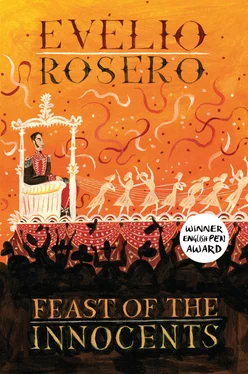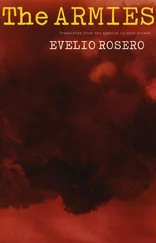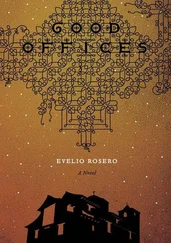The ape allowed the destination of the crowd to pull him along. He thought that sooner or later, by chance in all the commotion, he would come across Primavera or Bolívar’s carriage, whichever cropped up first. He would receive them gratefully, as one might receive infinite repose, but he would abandon Bolívar’s carriage to the mercy of the world, and Primavera he would take home, to bed, and into his arms, he thought. And yet, after an hour adrift he lost hope: corner followed corner with-out a sighting, the carnival soon smothered him: Primavera was nowhere to be found, better to return home as soon as possible and wait for her — as the world seemed to be advising him. But immediately after coming to this decision it became impossible for him to go towards any destination other than where the crowd was heading. He made out a carnival donkey on the other side of the avenue, a donkey separate from the group of weavers who were parading along: the donkey was spinning rapidly around among the revellers. Me and that donkey are the only animals here, he thought, and he examined himself again, inside his ape suit — what was it for? Wouldn’t it be better to drink to the point of oblivion, turn into smoke blown away on the wind? Then the mob seemed to push him towards the spinning donkey, and, funnily enough, from the other pavement the crowd seemed push the donkey towards him. The multitude lapped around them, like dark waters opening up to the point of devouring them — like one more carnival game.
A few metres away, General Lorenzo Aipe and Primavera Pinzón observed him for the last time. They had discovered him long before, when he took off his ape head to speak to the old people, but under the balcony where he shouted to Sarasti “there’s an absolute forest of people” was where they properly recognized him, and it was where Primavera did not know what to do: she did not know herself, her life and her daughters, she did not know whether to run to him, embrace him or lose him again — she thought — for all eternity. When she realized she did not love him, she felt a tremendous sorrow for him, to the point of tears, but composed herself in time: General Lorenzo Aipe did not notice her emotional state. The general was sweating, dressed as Bolívar: he could think of no better costume to taunt Doctor Proceso with, a Simón Bolívar in civilian clothing: tall straw hat, with red-and-blue poncho, woollen jacket and breeches, and long leather boots.
That morning General Lorenzo Aipe had personally taken charge of Bolívar’s carriage. His soldiers located the float a day earlier, but he chose the dawn of the sixth to surprise the artisans and confiscate it. None of them put up any resistance: some were in nightclothes, others in their underwear; they were frightened men, women and children, of all ages. They had hidden the float in a shed on the outskirts of Pasto, on one side of the cold highway leading to Lake Cocha, and now it had been found: soaring up like a ship in full sail, it seemed to touch the sky; he was a monster, this Bolívar pulled along by girls, Emperor of the Andes. But that early morning, Arbeláez the sculptor, Martín Umbría and Maestro Abril, makers of the float, lost heart: the soldiers spread out around the inside of the shed, pointing guns at them.
On the night of the fifth they had resisted an attempt by hooded men to blow up the float, who besieged them without order or agreement, and who — following their strange engagement — took flight, in the rain. They threatened them with blowing the float sky high in the procession—“and you’re responsible for putting the citizens of Pasto at risk”—but nothing more, only words; they fled, the gun that one of them was holding went off in his hand, which made the women laugh. Two more fired without consequence: one hit the ceiling, above his own head, and a cascade of falling plaster turned him white, and the other struck Boozy, Maestro Abril’s dog, and did not even hurt him, it was just a graze, but they heard him yelp, which inflamed the children. “It’s not the dog’s fault,” they cried, and the fight began. The youngest artisans easily took care of those in hoods, who outnumbered them. When the makers entered the fray, genuinely determined to defend the float from the destroyers, the hooded ones were already “scampering away like guinea pigs”—according to Maestro Abril. And, yet, the winds of victory did not stay the course: now it was not a matter of hooded men — more amusing than dangerous — but the army itself. “Sonofabitch,” they said, this is serious: the army was pointing guns at their chests; they were surrounded.
They confiscated the float, along with the truck carrying it and everything: Martín Umbría’s truck.
General Lorenzo Aipe considered the mission accomplished. He regretted the military deployment, and that was what upset him most; he ordered the soldiers to return to base, “quietly,” and climbed into the jeep waiting for him; a cinch, the only tricky bit had been finding out where the float was hidden. Now all he thought about was his Simón Bolívar costume, and blonde Primavera Pinzón, naked. He retired, leaving an officer and seven soldiers in charge of transporting the float; he did not even want to look at it in any detail, but he did order it to be covered up as soon as possible: “Don’t let anybody see it,” he said, “that’s the main thing.”
The soldiers proceeded to cover it up immediately, even though it was early and all Pasto was sleeping. Shrouded, the float looked like who knows what kind of folly-surprise, advancing through the streets of Pasto in the early morning of the sixth.
They were taking it to the barracks to dismantle it.
There were seven soldiers and their officer — later people would say there were twenty, fifty, a hundred and many more. They were not far from the barracks when Martín Umbría, Tulio Abril, Cangrejito Arbeláez and the rest of the artisans caught them up — backed up by their wives and children. The soldiers did not suspect the attack. They thought it was a parade group arriving in Pasto to join in White Day: they were dancing, throwing streamers and drinking. Perhaps the only peculiar thing was the time: too early in the morning for such larks. But anything was possible at carnival.
It was the same early hour that in another part of the city the secret poet Rodolfo Puelles confused with dusk.
Now it really was getting dark, but the carnival was still in full swing, and it danced in front of the Spinning Top, in that Pasto street where Rodolfo Puelles still lay, not moving.
“Okay, Puelles, wake up,” a voice said. “We’ve been looking for you.”
And a different voice:
“The moment of truth has arrived, Puelles. Get up. They’re here, and they want to meet you; on your feet, Puelles. The time has come to walk.”
He opened his eyes. Suddenly he saw Quiroz: his head. Quiroz moved to the side to allow Ilyich’s head to appear.
They had both shaved off their hair.
Platter Ilyich laughed, his mouth very wide open.
“They want to meet the chosen ones, and you are a chosen one, of course.”
He bent down and placed a hand like a bird’s talon on Puelles’s shoulder:
“Let’s go. It’s getting late.”
Quiroz looked at his watch:
“They’re not far away.”
Puelles started to get up: the bird’s talon weighed his shoulder down, rather than helped him. It must be five o’clock; it was getting dark. Puelles panted, gulped down air. He still felt exultant:
“And where did you leave the donkey?”
Quiroz did not miss a beat:
“We showed off the donkey this morning,” he said. “We got delayed by a monkey.”
It was the only time they ever laughed, all together. In his delirium, the secret poet did not imagine what monkey they were referring to; Rodolfo Puelles did not imagine anything at all.
Читать дальше












